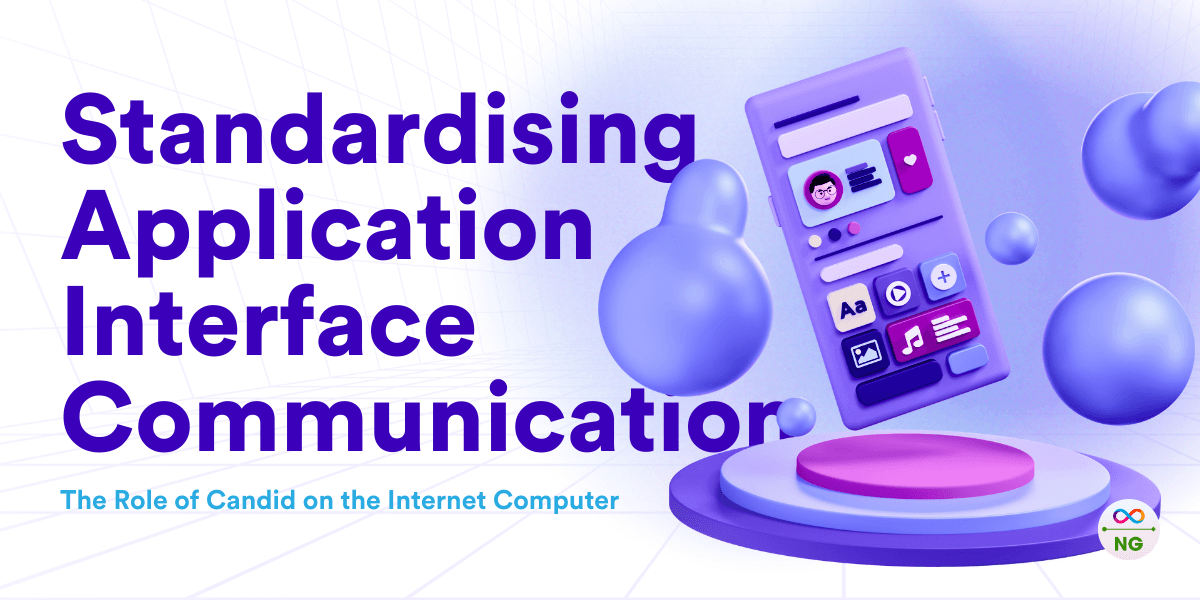Standardising Application Interface Communication: The Role of Candid on the Internet Computer
March 5, 2025

The Internet Computer Protocol (ICP) is a decentralized computing platform designed to host and execute applications at scale. One of its key innovations is Candid, an interface description language (IDL) that enables seamless communication between canisters (smart contracts) and external applications.
If you're a developer working with ICP, Candid simplifies the process of defining, encoding, and decoding messages exchanged between different components within the ecosystem.
Why Candid Matters to Developers
In traditional blockchain environments, smart contracts often interact with external applications in rigid and complex ways. ICP addresses this issue through Candid, which standardises how data is structured and transmitted. Here’s why Candid is a game-changer for you as a developer:
- Language-Agnostic Interoperability: Candid enables communication between canisters written in different programming languages, such as Rust, Motoko, and JavaScript.
- Automatic Code Generation: It allows developers to generate bindings in multiple languages, reducing the need for manual data serialisation.
- Seamless Integration: Candid provides an easy-to-use interface for interacting with smart contracts and external applications, making the development process more efficient.
- Self-Describing API: Canisters expose their interface in a structured way, making it easy to discover available methods and data types.
Candid’s Core Features
1. Standardized Data Representation
Candid provides a structured way to represent data, ensuring that different applications and services can communicate without misinterpretation. Defining a common format eliminates issues arising from variations in data handling across different programming languages.
2. Cross-Language Compatibility
One of the biggest challenges in software development is ensuring that different languages can communicate effectively. Candid solves this by acting as a bridge between applications written in Motoko, Rust, JavaScript, and other languages, allowing developers to work in their preferred environment without worrying about compatibility issues.
3. Evolving Interfaces Without Breaking Compatibility
Software evolves, and so do the interfaces that define how services communicate. Candid allows for controlled interface updates, ensuring that changes don’t break existing applications. This feature is particularly useful in a decentralized environment where upgrades need to be seamless.
4. Support for Asynchronous Calls
ICP operates on an asynchronous model, meaning calls to canisters do not execute instantly. Candid is designed to handle this natively, allowing developers to structure asynchronous function calls efficiently.
How Candid Works in ICP Development
When developing applications on ICP, you’ll often define canister interfaces using Candid. This helps ensure that services can easily interact with each other. Here’s how it works:
Defining a Canister Interface
Developers define a canister's public methods and expected data types in a Candid interface file (.did). This file serves as a contract, ensuring all interactions conform to a standardized format.
Interacting with Canisters Using Candid UI
To simplify development and testing, ICP provides a Candid UI tool, which allows developers to interact with canisters directly from a web-based interface. This eliminates the need to manually construct requests or write test scripts.
Binding Candid to Frontend Applications
For front-end integration, developers can use Candid’s auto-generated bindings in languages like JavaScript. This enables seamless communication between web applications and canisters deployed on the Internet Computer.
The Role of Candid in Scaling the Internet Computer
The Internet Computer aims to host a new generation of decentralized applications and services that function natively on the internet. To achieve this, it needs a highly flexible and scalable communication protocol—Candid plays a crucial role in this vision by ensuring:
- Secure, structured, and scalable data exchanges
- A smooth developer experience through automated serialisation
- Interoperability across various programming environments
Candid is not just another interface description language; it’s a fundamental building block that enables the seamless expansion of the Internet Computer ecosystem.
Conclusion
Candid simplifies smart contract interactions, ensures type safety, and enables cross-language compatibility within ICP. If you're building dapps on ICP, leveraging Candid will help you create seamless, efficient, and scalable applications. Following the Introduction to Candid tutorial and experimenting with canister interactions will allow you to harness the full potential of this interface description language.
For further learning, explore the official Candid documentation and experiment with sample projects to gain hands-on experience.
Article By: Mana Lamja